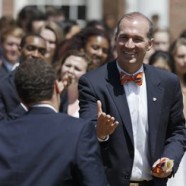
When my younger brother, Richard, graduated from college, he worked for Senator Daniel Patrick Moynihan of New York. Senator Moynihan—a liberal Democrat—regularly had breakfast with the staunchly conservative Senator Strom Thurmond of South Carolina. Today’s political culture would label these two senators enemies. Legend has it that the first half hour of their shared meals involved their ridiculing one another’s positions with passion and, often, spectacular humor. Once that exchange was out of their systems, they got down to business. They knew that regardless of their differences—which could be extreme—their responsibility to the people of the United States required that they collaborate, that they work together through tremendously complex policy issues.
Many have heard me describe Milton people as “beautifully opinionated.” Milton students, faculty, staff and alumni are diverse—of thought, background, talent, ethnicity and lifestyle—and that is a great source of strength for our School. It stands to reason that the more diverse the group of people who are living and working together, the more challenging—and important—the act of listening and understanding each other is. At its core, Milton has always prioritized growing and learning among individuals who share widely divergent life stories, and respecting each other’s backgrounds and cultures, as an invaluable aspect of a true education.
With “Dare to Be True” as our watchword, how do we effectively, productively, live and learn together when many of our “truths” are divergent? When intelligent and strong-willed individuals perceive that their daily realities are different from the mainstream, invisible perhaps, or under-appreciated? Not easily, not perfectly, and not separately. Every day at Milton, we work toward finding the balance between advocating fervently for what we believe, and also acknowledging a commitment to classmates, teachers, neighbors with whom we disagree. Doing this well means striving toward ideal expressions of respect, civility and understanding. It means developing open-minded self-awareness, integrity, empathy, curiosity and the ability to work as a team member—critical skills today and at all times. We work hard to develop these key competencies in our students.
Complicated questions—issues with which we wrestle in classes and across campus—require nuanced responses, reached only through intense, creative work with one another. Many of today’s public figures promote simplistic answers, based in narrow “truths,” as solutions. Our children, our students, deserve leaders who truly help move everyone forward. Milton prepares young people to understand how to lead when complicated, inclusive approaches to complex issues are necessary. Making this kind of progress comes only with a steady commitment to collaboration, and to recognizing the value of everyone’s contribution to a collective idea.
Milton has always been known for helping young people find their voices. Today, they find out who they are, and what they can offer, as team members in project-based group work—tackled by students in every grade, in every discipline. From debates around the Harkness table in history classes, to the “Design Your Own” lab experiments throughout the science curriculum; from sophisticated theatrical productions to sports competitions; from kindergarten conversations about sharing to a senior project on designing a service website. As we can see from this Milton Magazine, and others, Milton graduates apply these attributes and skills to accomplish forward motion that affects us all.
Recently, student leaders of Onyx (Milton’s black culture club) and The Conservative Club worked together to create meaningful conversation on campus about the Black Lives Matters campaign. Israel Moorer ’16 and Tiara Sharma ’16 co-founded Assad, a publication whose mission is to illuminate “narratives around race, class, sexuality, gender, religion and (dis)ability.” These conversations, among others that we must address, are difficult. They are fraught with emotion, and they require extraordinary courage. Time and again, students and adults at Milton rise to that challenge.
Educating our students to take responsibility and act on behalf of everyone is not only a moral imperative, it’s a pragmatic necessity. Milton helps young people “Dare to Be True” in a modern context. Our motto demands the best of the individual, and while we determine our personal truths, we must acknowledge our inextricable connection to one another. We will continue to struggle, disapprove and misunderstand, as well as coalesce, engage and empathize. Milton will continue developing young people interested in, and capable of, finding ingenious, practical responses to complex problems. I can confidently predict that future Milton alumni will be deeply involved in finding the common good, even when that means breaking bread with someone whose “truth” is quite different from their own.
by Todd B. Bland



